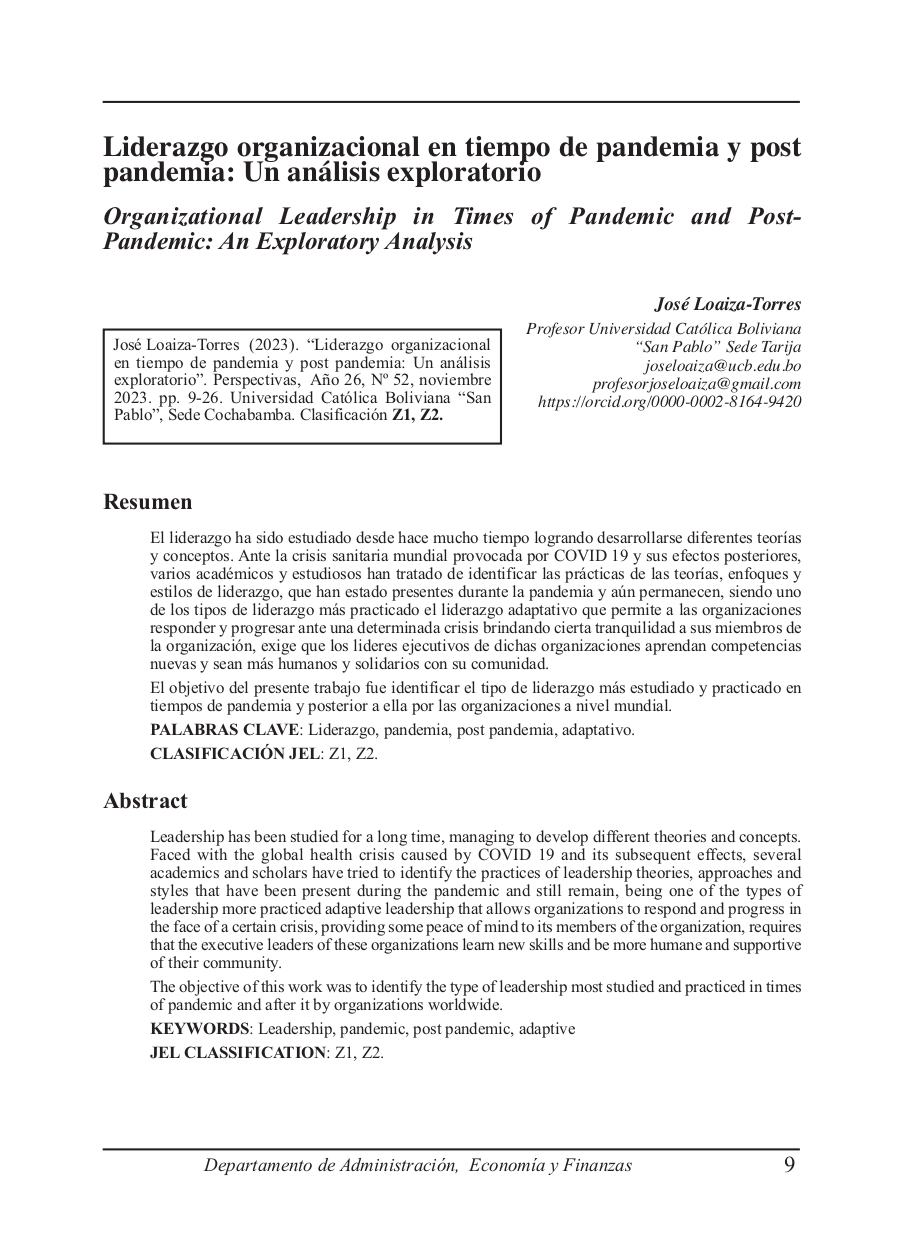Organizational Leadership in Times of Pandemic and Post-Pandemic: An Exploratory Analysis
DOI:
https://doi.org/10.35319/1tgqb762Keywords:
Leadership, Pandemic, Post pandemic, AdaptiveAbstract
Leadership has been studied for a long time, managing to develop different theories and concepts. Faced with the global health crisis caused by COVID 19 and its subsequent effects, several academics and scholars have tried to identify the practices of leadership theories, approaches and styles that have been present during the pandemic and still remain, being one of the types of leadership more practiced adaptive leadership that allows organizations to respond and progress in the face of a certain crisis, providing some peace of mind to its members of the organization, requires that the executive leaders of these organizations learn new skills and be more humane and supportive of their community.
The objective of this work was to identify the type of leadership most studied and practiced in times of pandemic and after it by organizations worldwide.
Downloads
References
Amigo, A. C. (2022). EL LIDERAZGO POST PANDEMIA. ACTAS Jornadas Anuales “Investigaciones En La Facultad” de Ciencias Económicas y Estadística, 1–12.
Angarita Vega, E., & Claro Pérez, D. F. (2022). Sustainable Leadership, The Role of Leadership in Post-Pandemic Sustainability. International Journal of Research Publication and Reviews, 3(12), 1607–1610. https://ijrpr.com/uploads/V3ISSUE6/IJRPR5313.pdf
Aranda, N., & Hoyos, P. (2020). El Líder De La Sociedad 5.0. UNIVERSIDAD EAFIT ESCUELA DE ADMINISTRACIÓN.
Barber, H. F. (1992). “Developing Strategic Leadership: The US Army War College Experience.” Journal of Management Development, 11(6), 4–12. https://doi.org/10.1108/02621719210018208
Bass, B. & Avolio, B. (1995). Individual consideration viewed at multiple levels of analysis: A Multi-Level Framework for Examining the Diffusion of Transformational Leadership. The Leadership Quarterly, 199–218. https://doi.org/10.1016/1048-9843(95)90012-8
Bass, B. M., Avolio, B. J., Jung, D. I., & Berson, Y. (2003). Predicting unit performance by assessing transformational and transactional leadership. Journal of Applied Psychology, 88(2), 207–218. https://doi.org/10.1037/0021-9010.88.2.207
Bolman, L. G., & Deal, T. E. (1995). Le a ding With Soul: An Unc ommon Journe y of Spirit. Business Horizons, 79–79.
Bomchil, C. (2020). Los líderes en la pandemia. MAÑANA PROFESIONAL, 19. Cao, H. (2017). Liderazgo: evolución y funciones. In Universidad Nacional de La Plata. http://sedici.unlp.edu.ar/handle/10915/63833
Daft, R. L. (2006). La Experiencia Del Liderazgo (M. Cengage & L. Editores (eds.)). https://books.google.com.bo/books/about/La_Experiencia_Del_Liderazgo.html?id=azuJyFsqS28C&redir_esc=y
Díaz Sarmiento, C., Roncallo Lafont, L., López Lambraño, M., & González Barranco, S. (2019). Liderazgo: Consideraciones Sobre Su Conceptualización, Evolución Y Retos Ante La Nueva Realidad Organizacional. Revista de Economía y Administración, 15(1), 71–88.
Dudley, D. (2010). Everyday leadership. TEDxToronto 2010. https://www.ted.com/talks/drew_dudley_everyday_leadership
Duro Martin, A. (2006). Introducción al liderazgo organizacional: Teoria y Metodología (S. L. DYKINSON (ed.).
Etkin, J. R. (2003). GESTIÓN DE LA COMPLEJIDAD EN UN ENTORNO COMPETITIVO LA COMPLICADA RELACIÓN ENTRE LA EFICACIA Y LOS VALORES SOCIALES. Revista de Ciências Da Administração, 5 (10), 1–12. http://www.redalyc.org/articulo.oa?id=273526072007
Fernández, M. C. (2017). Liderazgo global ¿Una nueva teoría? Pizarrón Latinoamericano, 8(5), 37–48.
García, V. A. M., Pantoja, O. A. M., & Duque, S. I. L. (2011). EL LIDERAZGO TRANSFORMACIONAL EN LAS ORGANIZACIONES: Un Análisis Descriptivo. Teuken Bidikay-Revista Latinoamericana de Investigación En Organizaciones, Ambiente y Sociedad, 2(2), 94-110., 2(2), 94–110.
GitHub. (2023). Voyant Tools. 2023. https://voyant-tools.org/
Giustiniano, L., Cunha, M. P. E., Simpson, A. V., Rego, A., & Clegg, S. (2020). Resilient Leadership as Paradox Work: Notes from COVID-19. Management and Organization Review, 16(5), 971–975. https://doi.org/10.1017/mor.2020.57
Goleman, D. (2005). Liderazgo que obtiene resultados. Harvard Business Review, 83(11), 109–122.
Harzing, A. W. (2022). Publish or Perish HARZING.COM. 2022. https://harzing.com/resources/publish-or-perish
Heifetz, R. A., & Laurie, D. L. (1997). The work of leadership. Harvard Business Review, 75(February), 124-134.
Hersey, P., & Blanchard, K. H. (1969). Life cycle theory of leadership. Training & Development Journal.
Hurtado, J. (2019). Un acercamiento sintagmático al concepto de liderazgo. Desarrollo Gerencial, 11(1), 190–208. https://doi.org/10.17081/dege.11.1.3465
Jaén Ferrer, P., & Cortés Borra, A. (2020). Liderazgo en tiempos de crisis sanitaria por covid 19. Metas de Enfermería, 23(July). https://dialnet.unirioja.es/servlet/articulo?codigo=7477500
Jaén Ferrer, P., & Cortés Borra, A. (2020). Liderazgo en tiempos de crisis sanitaria por covid 19. Metas de Enfermería, 23(6). https://dialnet.unirioja.es/servlet/articulo?codigo=7477500
McMullin, C., & Raggo, P. (2020). Leadership and Governance in Times of Crisis: A Balancing Act for Nonprofit Boards. Nonprofit and Voluntary Sector Quarterly, 49(6), 1182–1190. https://doi.org/10.1177/0899764020964582
Miller, A. (2018). Text Mining Digital Humanities Projects: Assessing Content Analysis Capabilities of Voyant Tools. Journal of Web Librarianship, 12(3), 169–197. https://doi.org/10.1080/19322909.2018.1479673
Mintzberg, H. (1973). The Nature of Managerial Work. New York: Harper & Row.
Nieto-Rivas, E. A., Fermín Pérez, F. A., Arieta Miranda, Y. M., Mondragón Silva, D. G., Atanacio Cuaresmayo, L., & Meneses Jiménez, J. Á. (2021). Experiencias del liderazgo directivo en tiempos de covid-19. South Florida Journal of Development, 2(4), 6228–6245. https://doi.org/10.46932/sfjdv2n4-095
Osborn, R. N., Hunt, J. G., & Jauch, L. R. (2002). Toward a contextual theory of leadership. T. The Leadership Quarterly, 13(6), 797–837.
RAE. (2023). Española, Real Academia. https://dle.rae.es/líder
Singh, R., Sihag, P., & Dhoopar, A. (2023). Role of resilient leadership and psychological capital in employee engagement with special reference to COVID-19. International Journal of Organizational Analysis, 31(1), 232–252. https://doi.org/10.1108/IJOA-09-2021-2975
Torner, C. (2021). Adaptive leadership and performance. Strategy under a covid19 context in a colombian electricity sector organization. Revista Estrategia Organizacional, 10(1), 1-23.
Torner, C. S. (2020). Pandemia Covid 19 y Liderazgo Adaptativo . Importancia de su sector eléctrico colombiano . Covid 19 Pandemic and Adaptive Leadership . of the Colombian electricity sector . Cuadernos Latinoamericanos de Administración, XVI(31), 1–19.
Zaccaro, S. J., & Klimoski, R. J. (2001). The nature of organizational leadership : understanding the performance imperatives confronting today’s leaders. Researchgate, January, 504. https://pdfs.semanticscholar.org/96f9/1e50ca4fb79f4840516606413d74e018b54c.pdf?_ga=2.67818001.1259414001.1590416622-145569250.1590416622

Downloads
Published
Issue
Section
License
Copyright (c) 2023 Revista Perspectivas

This work is licensed under a Creative Commons Attribution-NonCommercial-ShareAlike 4.0 International License.
La Revista Perspectivas de la Universidad Católica Boliviana, es una revista de acceso abierto, por lo tanto, es de libre acceso en su integridad. Está permitida su lectura, búsqueda, descarga, distribución y reutilización legal en cualquier tipo de soporte únicamente para fines no comerciales, siempre y cuando la obra sea debidamente citada.




